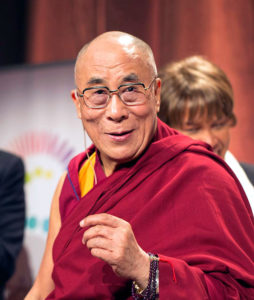China’s ongoing war of words with the Dalai Lama took a new turn in 2015. In a mid-December 2014 interview with the BBC, the exiled Tibetan spiritual leader dropped a bombshell with his remark that his reincarnation was not a certainty. Whether or not he had an officially designated successor, he said, would be ‘up to the Tibetan people’, adding that, ‘the Dalai Lama institution will cease one day. These man-made institutions will cease’.
How the Tibetan people would make clear their choice, the fourteenth and longest-serving Dalai Lama did not explain. But as he approached his eightieth birthday in 2015, his words were clearly a shot across the bow of the PRC government, which has long claimed its authority to designate the Dalai Lama’s reincarnated successor, in line with its requirement that all religious practitioners inside China recognise the ultimate authority of the Communist Party.
It was not the first time the Chinese government and the Dalai Lama had clashed over issues of succession. When, in 1995, the Dalai Lama named a young Tibetan child as the reincarnation of the Panchen Lama (the second most revered position in Tibetan Buddhism’s hierarchy), Beijing promptly took the child into ‘protective custody’, and named another. The government’s chosen Panchen Lama now fulfills the public role of that position within China; the Dalai Lama’s choice, the government claims, lives a guarded but more-or-less normal life somewhere in Tibet.
In early 2015, at a press conference on the sidelines of the annual gathering of China’s two legislatures in Beijing, Zhu Weiqun 朱维群, the chair of the Chinese People’s Political Consultative Congress’s Ethnic and Religious Affairs Committee, accused the Dalai Lama of not showing a ‘serious or respectful attitude’ on the issue of reincarnation, and reiterated that ‘the reincarnation of the Dalai Lama has to be endorsed by the central government, not by any other sides’.
Seemingly undeterred, in a July interview with Nicholas Kristof of The New York Times the Dalai Lama hinted that he had in mind a referendum of some kind among Tibetans to clarify the question of his succession. He also had a laugh at the CCP’s expense, saying the Party was ‘pretending that they know more about the reincarnation system than the Dalai Lama’, and suggesting that the CCP ‘should recognise the reincarnation of Chairman Mao Zedong, then Deng Xiaoping. Then they have the right to involve themselves in the Dalai Lama’s reincarnation’.
The government was not amused by the suggestion. Writing in the Chinese-language Global Times in late November, Zhu Weiqun emphasised historic precedents for the government’s position, highlighting the important role the Qing government had also played in the process; his claim, however, that this demonstrated China’s sovereignty over Tibet glossed over the fact that over the course of the almost three-century-long dynasty (1644–1911), Beijing’s say over this matter waxed and waned along with its influence in Llasa, and was often subject to highly contentious political maneuvering.
Compromise does not seem to be on either side’s agenda. In the same article, Zhu made clear how the government views the stakes in this theological debate when he wrote that ‘the power of the central government to decide in matters of living Buddhas [such as the Dalai Lama] cannot only not be allowed to weaken, but must be strengthened to ensure victory in the struggle against separatism’.



